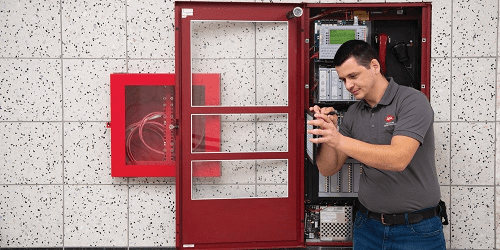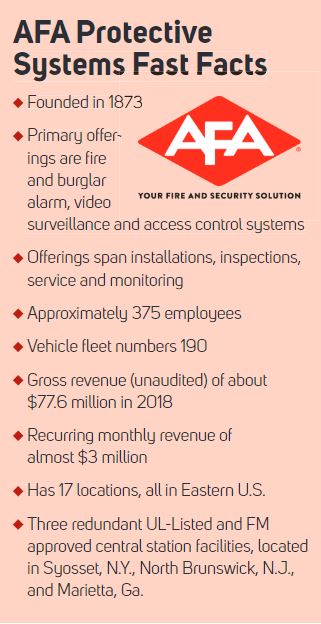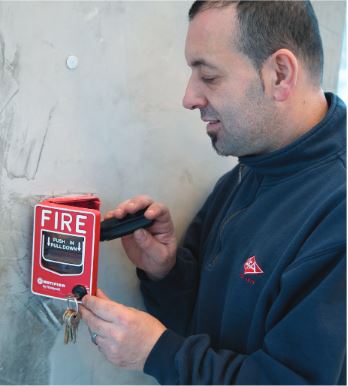
3.18.19 – Security Sales & Integration
When a company is one of the longest established in its industry and has revenues among the highest in that field there is the distinct possibility that the dreaded ‘c’ word — complacency — could rear its destructive head.
While being the fat cat is certainly better than struggling like a hungry dog, for a business to avoid stagnation and lost market share it’s essential to maintain the eye of the tiger. That is not lost in the least by AFA Protective Systems, which more than a century after its founding continues to partner with its clients, refine operations, pursue new opportunities and grow.
Beginning life as Automatic Signal Telegraph Co. of NYC in 1873 and beginning to transmit fire alarm signals two years later, the firm became Automatic Fire Alarm in 1948 and in 1970 changed to its current moniker. That was just after Philip Kleinman took control of the business, following the Grinnell divesture that broke up ADT, Holmes and AFA.
His sons, Robert and Richard Kleinman, began working at the company shortly thereafter and are now, respectively, CEO and COO. The third generation, David and Jared Kleinman, are also executives in the business.
Through the years as AFA Protective adopted new technologies and offered expanded services (including what it says is the nation’s longest-running central station), it continued to grow both its revenues and geographic footprint.
Today, the full-service fire and security systems provider runs 17 locations spanning the entire Eastern U.S., with three monitoring facilities and 375 employees generating nearly $80 million in annual revenues.
A top recent initiative has been to increase recurring monthly revenue and to that end nearly half of AFA’s income is now derived from RMR. This includes the February announcement of a new two-year, $8.2 million fire alarm inspection contract at JFK Airport from the Port Authority of New York and New Jersey.
The deal was the firm’s largest ever of its kind and has enabled the Syosset, N.Y.-headquartered AFA Protective Systems to achieve a 20% bump in its RMR base the past three years.

To find out more about that growth and how AFA is streamlining operations, overcoming challenges, tackling trends, opening up markets and outfoxing competitors, SSI spoke with a half-dozen of the fire and security contractor’s leadership team.
Sharing that insider perspective just ahead are COO Richard Kleinman, Executive Vice President David Kleinman, Vice President & CIO Mark LaBua, Vice President of Branch Operations Mike Slattery, Vice President of National Accounts Stephen Hyle and Vice President of Marketing Jared Kleinman.
The business has come a long way in its nearly 150-year history. What are the most significant recent developments?
RICHARD KLEINMAN: The biggest thing is a strategic shift to focus on recurring revenue. That’s been the theme of everything we’ve done. In addition, we started really trying to market the company better. It’s been a very interesting process re-doing the website and rebranding. Jared was the one who led this initiative. Marketing to commercial property managers is not the same thing as sending out a flyer to a residential customer. For the most part we’ve been successful with it, but we’re fine tuning how to go to market.
JARED KLEINMAN: We have placed an emphasis on targeted and trackable channels of marketing that generate a reasonable return on our investment, and we have ramped that up over the past five to six years. That correlates to our focus on specifically marketing to build our recurring revenue base. Another big trend for us the past few years has been focusing on building technology internally and customer facing so we can deliver our services more efficiently. We understand people want the ability to make changes to their alarm system, receive information immediately and have the ability to access their account information securely. We have paths that allow our customers to access their central station account information and see what’s going on. Instead of calling in, they can manage their account remotely, and we’ve been making a push on that.
R. KLEINMAN: We’ve developed a couple of apps for internal use. We have a service tech app. Other people have this. It’s not rocket science, but it cuts down tremendously on our in-house paperwork. When service techs are onsite, we know where they are. We know how long they’re there. We know what materials they used on a job, and it helps our service billings go out quicker. We also have a project manager app. When they’re out on a job, they can just enter information, and it gets updated so we can all see what’s going on.
MARK LABUA: In addition to those apps, we’ve created and implemented a new sales estimating tool. We hope it will have a major effect on the company and allow the salespeople to be more efficient and quote jobs quicker, providing more detail and allowing them to get to the next opportunity that much faster.
R. KLEINMAN: We’re also developing a single integrated customer app for a multitude of control and functions. This way customers don’t have to download and use three or four different ones.
MIKE SLATTERY: On a company-wide level and by branch, we’ve been bolstering the salesforce the past few years. Our anticipation for 2019 is that we should really begin to start taking advantage of the time, energy and effort we’ve put into hiring, training and preparing the salesforces in all our branches to go to market and have one of our most successful years ever. Our projections for business in our branches are all higher than they were in previous years, and we expect the company to do very well in 2019.
STEVE HYLE: With respect to national accounts, we can continue to anticipate steady growth. One of the strongest areas of growth we’ve experienced the past decade and will continue to anticipate experiencing is life-safety inspections, specifically fire alarm inspections for our clients. It’s something we continue to see a lot of interest in on the part of our national accounts for those services.
DAVID KLEINMAN: The economy seems to be pretty good right now and people are spending money. I can say that since I’ve been approving jobs, which began midway through 2015, this year was the strongest January I’ve ever seen — and that is excluding the JFK contract. I don’t know if it’s just from the economy. I don’t know if our salesforce is just better equipped, if they’re more comfortable, if it’s we’re going into newer markets, because for the most part it still seems to me the large jobs coming in are commercial fire alarm jobs, but the opportunities are there.
One of the larger jobs we had was a fire alarm installation for a V.A. hospital, and now we’re able to pick up the recurring revenue on that hospital. We are GSA listed, which enables us to get into government opportunities. In Atlantic City, we were able to get a fire alarm retrofit in a casino. There’s also a fire alarm system, a conversion from a competitor over to AFA for a hospital. We’re doing well and, as Jared had mentioned, with marketing efforts and having redesigned our commission plans geared towards recurring revenue, 2019 looks to be very good indeed.
HYLE: From a national account perspective, across our account base we’re seeing the emergence of clients utilizing web portals associated with facilities service or automation systems. When working with these clients, you have to be familiar with the processes by which their portals operate. This includes different levels of reporting as well as processes for dispatching service, and reporting from a field level back to that portal. There’s a lot of complexity, and as a result the complexity of our business has increased exponentially in recent years.
SLATTERY: From a branch perspective, the greatest challenge is maintaining trained and licensed staffed professionals to do our field service and inspection work. We need to keep our customer service levels at the appropriate point where our customers have grown used to us being a great service organization and highly responsive. There seems to be fewer people coming into our industry, so we are challenged with identifying young people, training them quickly, getting them licensed and making them effective as fast as we can. The same goes for taking in people from other companies and teaching them the way AFA does things.
D. KLEINMAN: Another challenge we deal with are the legal terms as everybody we’re trying to do business with has a contract. We have a contract, whether it’s for the sale of equipment or for the sale as well as installation of the system, and we also have a service contract. Everybody on the other end also has a contract. Say I’m a property manager, you’re coming into my building and I have a contract. Or I’m a retail provider, and I have this contract. Or I’m a school board, and I have that contract. Legally working through all of the contractual hang-ups can be very taxing for all involved.
Let’s talk about AFA’s company culture. How would you describe it and how does it permeate through the organization?
R. KLEINMAN: We have a lot of people here a very long time, with 20-30+ years not uncommon. We have a lot of people here whose family is here, the brother, the cousin. It’s a large company in the industry but we still have a familial feel and people get to know each other rather than just being a number. We’re interested and we’ve always cared about the employees. We want to make sure they have proper benefits, that they realize we care about them.
HYLE: Compared to most organizations out there, there is a profound sense of reciprocal loyalty that you just typically don’t see in the business environment today. There’s reciprocal loyalty from the management to the employee base and from the employee base back up through the organization. It’s really unique.
J. KLEINMAN: There’s a certain sense of doing the right thing, and that’s cultural and that starts from the top. We’ve learned through the years we might not always get it correct the first time, but ultimately we always do the right thing and always finish the job. We’re not the type of people who would leave an associate or customer in a bad situation. We’ll trudge through it and get the job done regardless of the circumstance. There’s a sense of integrity that goes along with that.
HYLE: Our employees serve as ambassadors of our organization to the marketplace. There is a true sense of wanting to make this organization the best it can be.
R. KLEINMAN: It depends where we’re located, that branch. A differentiator for us is that we can do everything from the beginning to the end when it comes to fire, burglary, access control or CCTV. We can install, we can service, we can maintain, we can monitor and we can file with the Authority Having Jurisdiction. We have licensed electricians on staff and we have professional engineers we can use, so we can take a job from the design process to the filing to the installation to the inspection to the test to the follow-up, everything. We’re there for the long term. That’s a major differentiator.
The company was started primarily with fire and we never really lost that focus. While many in the industry have become enamored with residential and whatever the new thing is, we have stayed the course. No matter what, you need a fire alarm system. It needs to be monitored and it needs to be inspected and maintained, and that’s the field we’re in. We do other things too, but we have five people at the company on NFPA 72 committees and we have a lot of NICET certified employees. In that fire business, we use NOTIFIER as our primary product. Years ago, we had a proprietary product that was one of the first ones for high-rise systems. But we are not a manufacturing company and we decided not to be proprietary.
That is because for a proprietary system it might be good at the beginning for a building owner or a person putting a building up on spec, but whoever ends up with that system is going to end up paying a big bill since there’s only one place to go. That means it doesn’t matter if the service is good, it doesn’t matter whatever they need done, it can only be handled by the company where they bought the equipment. Whereas for a nonproprietary system, which we now use, the customer has choices. We have to be basically on our ‘A’ game all the time or they switch. That forces us to give the type of service the customer wants and deserves.
HYLE: To build on Richard’s point, our strength and competency in life safety, specifically fire alarm, facilitates our ability to become a full-service provider to our clients. Obviously, our responsiveness, the quality of service we provide, that triggers new opportunities for us across all of our retail chain accounts. So in the cases where we lead with fire, it’s not uncommon for us to build on that through security as well as video, you name it.
J. KLEINMAN: What we’re facing with competition a lot of the time is there’s a race to the bottom. People are trying to just give away equipment in order to get in there. That’s not the game we’re in. We believe we offer a better quality of service and we do our best to get the job right the first time. We’re not just throwing equipment in so we can plant a flag in a building and leave that customer stuck with us and a contract. We know we’re in a business that’s highly competitive and have to service the customer correctly so they stay with us for the long haul. That’s the kind of relationships we try to build and why I believe we have one of the lowest attrition rates in the industry.
A challenge we have is being known as the oldest central station monitoring company and a lot of people think we’re only that when we’re capable of doing everything. We’re able to design-build, we can expedite, we can create, we can install the actual equipment and we service it afterward. Since people don’t realize that — for example if Kleenex started making another product you’re still going to think of them as a tissue company — we’re trying to break that mental construct and it is difficult.
What makes us different and unique, what I use to sell our brand, is our responsiveness is better. We’ll get back to the customer. We won’t leave a customer hanging. We’re there, we’re their partner and they can trust us. Nobody can boast about the longevity we’ve had, so I always harp on the experience. When you put those things together, that’s our value proposition.

While AFA Protective today offers myriad services, its roots are in fire systems and that still comprises approximately 60% of the firm’s business. Specialities include installation, maintenance and inspections.
Let’s move on to technology. Looking at it from the fire/life-safety and security perspectives, what excites you right now and why?
SLATTERY: On the fire side, the newest and most interesting technology is the introduction of BDAs, or bidirectional amplifiers. We’re in the process of getting people in all of our branches licensed with their FCC general radio operators’ license, or GROL, and trained on bidirectional amplifiers. This is in anticipation and preparation for the larger urban markets around the country to start requiring them to allow first responders within a facility to maintain radio communication between each other without interruption. That’s new. That’s exciting for us. We’re preparing like it’s going to be a big part of the fire alarm market, and if it is then we’ll be ready.
LABUA: You could probably add the whole IP and cellular transition into that category, as well as the wireless capabilities that are being developed for enterprise-class fire alarm systems.
R. KLEINMAN: The cellular and Internet area is a big push for us as it did not really come of age for the fire market until recently. Moving alarm transmission to Internet and cell gives the customer two paths of communication and two different technologies. For those in the Northeast who experienced Hurricane Sandy and other weather issues, having a second source to be able to transmit a signal on a different technology is very helpful. We’re excited about the opportunities in these areas.
HYLE: It’s not only about the technology changes but also the use of technology. We really go the extra mile with our chain accounts to listen to their pain points, trying to discover how we can truly act in the capacity of a solution provider and address issues they would otherwise be hard pressed to solve. For one customer that had shrink issues we were able to reduce loss associated with organized retail crime and in the course of doing so, improve sales within that particular department. It was something unique that didn’t exist anywhere else in the marketplace and the customer was extremely appreciative. The broader mission with technology is to try to better understand how we can truly act in the capacity of a solution provider for all of our customers. It’s not just about saying it.
Get an inside look at AFA with this slideshow.
